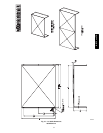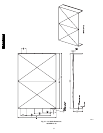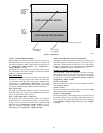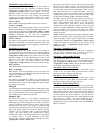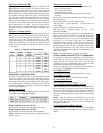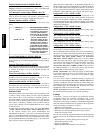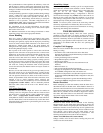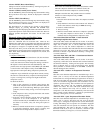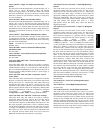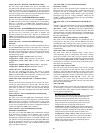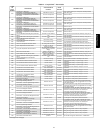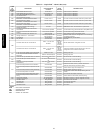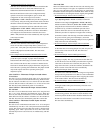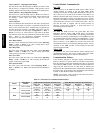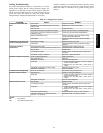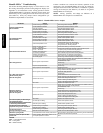
39
Alert Code T075 − Supply Air Temperature Thermistor
Failure
This alert occurs when the temperature is outside the range –40 to
240F (–40 to 116C). Economizer cooling and adaptive
compressor staging cannot occur while this alarm is active. This
alert resets automatically. The cause of the alert is usually a faulty
thermistor, a shorted or open thermistor caused by a wiring error,
or a loose connection.
Alert Code T076 − Return Air Thermistor Failure
This alert occurs when the temperature is outside the range –40 to
240F (–40 to 116C). This alert will only occur if the unit is
configured for a return air sensor. Economizer differential dry bulb
control will not be allowed during this alert. This alert resets
automatically. The cause of the alert is usually a faulty thermistor, a
shorted or open thermistor caused by a wiring error, or a loose
connection.
Alert Code T077 − Space Relative Humidity Sensor Failure
This alert occurs when the input is less than 3.5 mA and the sensor
is configured as installed. If a humidistat is not installed, then
dehumidification will not be functional. Check sensor and wiring.
This alert clears automatically.
NOTE: An ECB must be installed to use the space relative
humidity sensor.
Alert Code T080 − Circuit C Saturated Condensing Temp
Thermistor Failure
See Alert T064
Alert Code T081 − Circuit Saturated Suction Temperature
Thermistor Failure
See Alert T066
Alert Codes T092, T093, T101 – Circuit Suction Pressure
Transducer Failure
Alert codes T092, T093, and T101 are for circuits A, B and C,
respectively. These alerts occur when the board does not properly
read the transducer voltage. A circuit cannot run when this alert is
active. Use the Scrolling Marquee to reset the alarm. The cause of
the alert is usually a faulty transducer, faulty 5−v power supply, or
a loose connection.
Alert Codes T102, T103, and T104 − Compressor Current
Sensor Failure
Alert codes T102, T103, and T104 are for compressors A1 and A2,
B1 and C1, respectively. These alerts occur when the output of the
current sensor (CS) is a constant high value. These alerts reset
automatically. The cause of the alert is a wiring error or a loose
connection. If the problem cannot be resolved and the CS board
must be replaced, the CS board can be temporarily disabled while
securing a replaced board. A CS board is disabled by setting the
corresponding configuration to DISABLE
(Configuration→COOL→CIR.A→CS.A1, CS.B1 or CS.C1).
Alert Codes T110, T111, and T140 – Circuit Loss of Charge
Alert codes T110, T111, and T140 are for circuits A, B and C,
respectively. These alerts have “Service Test” text that will be
displayed if the alert occurred during service test. These alerts
occur when the compressor is OFF and the suction pressure is less
than 5 psig and OAT is greater than –5F for 1 continuous minute.
Use the Scrolling Marquee to reset the alert. The cause of the alert
is usually low refrigerant pressure or a faulty suction pressure.
These alerts only occur when the compressor is OFF because the
low refrigerant pressure alarms (alerts T133, T134 and T141)
handle this situation when the compressor is operating.
Alert Codes T126, T127 and T142 − Circuit High Discharge
Pressure
Alert codes T126, T127, and T142 are for circuits A, B and C,
respectively. These alerts have “Service Test” text that will be
displayed if the alert occurred during service test. These alerts
occur when alerts T051, T055, or T059 are active while the
appropriate condensing temperature is greater than 150F. These
alerts reset automatically. The cause of the alert is usually an
overcharged system, high outdoor ambient temperature coupled
with dirty outdoor coil, plugged filter drier, or a faulty
high−pressure switch. See Alerts T051, T055 and T059 for
diagnostic procedure.
Alert Codes T133, T134 and T141 − Circuit Low Refrigerant
Pressure
Alert codes T133, T134 and T141 are for circuits A, B and C,
respectively. These alerts have “Service Test” text that will be
displayed if the alert occurred during service test. These alerts
occur when the compressor is operating and the evaporating
temperature (converted from the suction pressure) is less than
configured low suction control levels,
Configuration→COOL→SST→SST.1 (Low Suction — Level 1)
or SST.2 (Low Suction — Level 2) or SST.3 (Low Suction Level
3). The circuit SST value must be less than SST.1 (for 5 minutes),
SST.2 (for 4 minutes), or SST.3 (for 3 minutes when using the
economizer and 1.5 minutes when not using the economizer) for
the alert to occur. When the outdoor temperature is less than 40F,
the above values are reduced 1F for every 2F the OAT is below
40F. An alert will also occur if the circuit SST value is less than
SST.3 –5F for 20 seconds and the outdoor temperature is above
40F. All the above timers will reset if the suction temperature rises
above SST.O for 1 minute. These alerts cause a strike for the
respective circuit. If the OAT is less than 10F, the circuit will shut
down without a strike. These alerts will activate when the coil
becomes frosted. However, during the 15−minute reset period, the
coils will thaw and strike should clear at restart if there is nothing
else wrong with the circuit. The alert resets automatically. The
cause of the alert is usually low refrigerant charge, dirty filters,
evaporator fan operating backwards, loose or broken belt, plugged
filter drier, faulty transducer, excessively cold return air, or stuck
open economizer when the ambient temperature is low.
Alert Codes T140 − Circuit C Loss of Charge
See Alert T110.
Alert Codes T141 – Circuit C Low Refrigerant Pressure
See Alert T133.
Alert Codes T142 – Circuit High Discharge Pressure
See Alert T126.
Alert Codes T143, T144 − Circuit Failure to Pressurize
Alert codes T143, T144, and T145 are for circuits A, B, and C,
respectively. These alerts have “Service Test” text that will be
displayed if the alert occurred during service test. These alerts
occur when the compressor turns on and the suction pressure does
not drop at least 10 PSIG and stay there for the first 20 seconds
AND the condensing temperature does not rise at least 5F and
stay there for the first 65 seconds (both conditions have to occur).
These alerts cause a strike for the respective circuit. The alert resets
automatically. The cause of the alert is usually compressor wiring
causing reverse rotation or a faulty compressor.
48/50PG and PM



